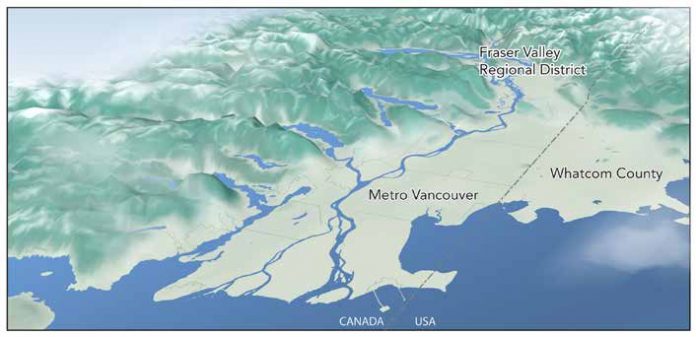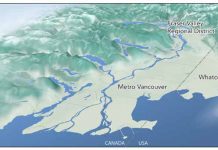METRO Vancouver Regional District is continuing an Air Quality Advisory due to high concentrations of fine particulate matter that are expected to last through today. The fine particulate matter is primarily due to smoke from wildfires burning throughout BC and Washington. The advisory began on August 25 and will remain in effect until further notice. Smoke concentrations may vary widely across the region as winds, temperatures, and wildfire behaviour change.
Air Quality Advisory (Fine Particulate Matter) in effect for:
- Metro Vancouver – Northwest
- Metro Vancouver – Southwest
- Metro Vancouver – Northeast
- Metro Vancouver – Southeast
- Central Fraser Valley
- Eastern Fraser Valley
Metro Vancouver Regional District has ended the ground-level ozone Air Quality Advisory issued on August 27. Ground-level ozone concentrations decreased due to cooler temperature and cloudy conditions.
Air Quality Advisory (Ground-Level Ozone) has ended for:
- Metro Vancouver – Northeast
- Metro Vancouver – Southeast
- Central Fraser Valley
- Eastern Fraser Valley
Postpone or reduce outdoor physical activity while fine particulate matter or ozone concentrations are high, especially if breathing feels uncomfortable. Exposure is particularly a concern for people with underlying conditions such as asthma, chronic obstructive pulmonary disease (COPD) including bronchitis and emphysema, and other lung diseases, heart diseases, and/or diabetes; individuals with respiratory infections; pregnant people; infants and children; older adults; and outdoor workers (e.g., construction and agricultural workers). Individuals who are socially marginalized may also be at higher risk (e.g., people who are experiencing homelessness or are underhoused).
As we are in the summer season with warm temperatures, it is also important to stay cool and hydrated. Indoor spaces with air filtration and air conditioning may offer relief from both air pollution and heat. Consider running a portable HEPA air cleaner in one or more rooms or spending time in public buildings with large indoor spaces and air conditioning (e.g., community centre, library, mall). Consider using a portable air conditioner to keep your indoor space comfortable (if you do not have central air conditioning). Overheating is more dangerous for most people at risk, and both cool and clean air are important.
If you are experiencing symptoms such as chest discomfort, shortness of breath, coughing or wheezing, seek prompt medical attention. Check in on family, friends and neighbours often. Call 9-1-1 in the case of an emergency.
Information about real-time air quality readings for Metro Vancouver and Fraser Valley communities and potential health impacts can be found at airmap.ca and https://www.env.gov.bc.ca/epd/
To sign up for air quality alerts in your area, go to: https://metrovancouver.org/











